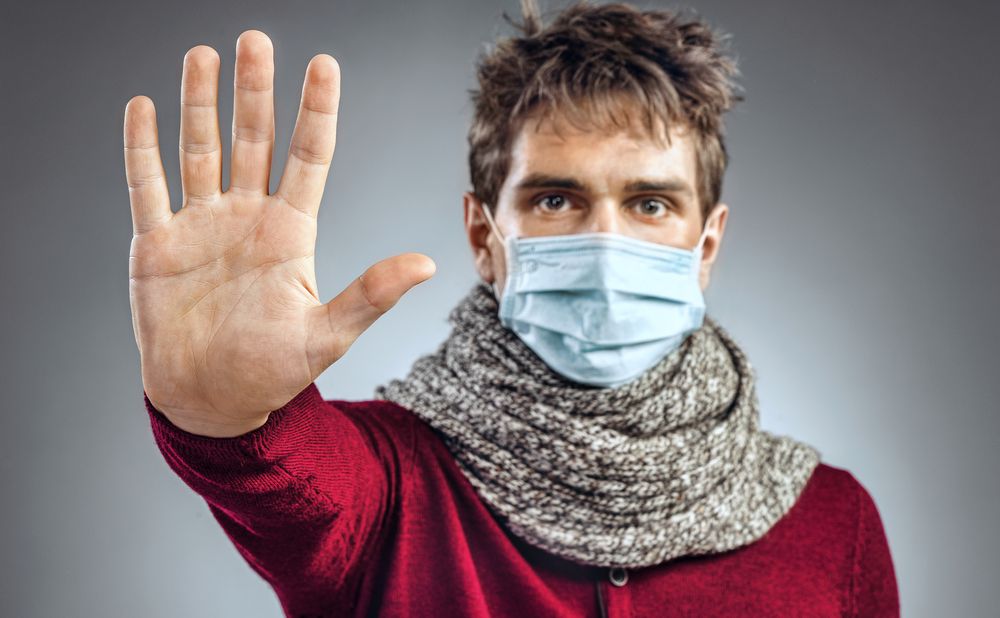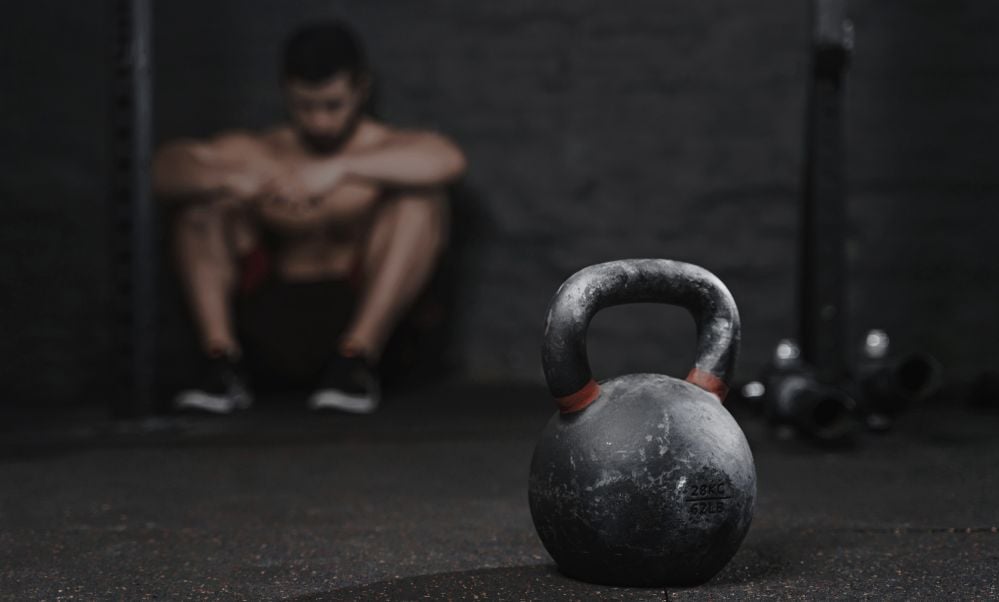Staying Fit When Sick: When Is Working Out a Terrible Idea?

Training while sick may have disastrous consequences. But other times it’s perfectly fine to work out. Learn when you should and shouldn’t skip the gym.
Self-diagnosing yourself is far from being an exact science. However, the information here will help you make an educated decision.
What Are the Risks of Training When Sick?
Depending on the cause of the sickness the consequences can range widely. The more serious the condition, the bigger the risks. Some of the negative outcomes include:
- complications (the sickness progressing to a more aggressive stage)
- the development of additional symptoms and secondary health issues
- largely increased recovery time
- notable decreases in general performance
- decreased muscle gain and even possible muscle loss
- higher chance of getting sick again in the near future
- inability to do any gym activities once you get too sick
- becoming bedridden or even having to be hospitalized
Unless you’re too stubborn you shouldn’t worry about the more extreme outcomes. It’s hard to keep up the training intensity as you get sicker. Though it’s impossible to say how much is too much. So you still want to be cautious.
Sometimes staying away from the gym for a couple of days is a smart choice. Especially when the alternative is to train hard until you get too sick. Then having to skip workouts for 1-2 weeks. Overtraining may also weaken your immune system and make you more prone to getting ill.
How Does Lifting Weights Weaken the Immune System?
Under normal circumstances, your body can recover from most acute stimuli. These are different stressors that often disrupt certain bodily systems. Stressors such as working out, stress at work, environmental toxins, and the normal processes of growth and repair.
Usually, the body recovers quickly. You rarely experience problems in normal functioning and performance. There are even spare resources for system adaptation and improvements.
But that equilibrium can easily be disturbed. Everything in the body is connected. When a single bodily system is overwhelmed others may also be affected. Resources that are usually used to cover one system’s needs might be diverted to deal with another’s increased needs.
What Happens When You Train with a Cold?
The immune system is responsible for keeping homeostatic balance. It’s mostly known for its role in protecting us from foreign bodies (e.g. bacteria or viruses). However, it’s also involved in general healing processes. This includes muscle repair and growth after training.
When you’re sick the immune system has to work extra hard. Usually, a minor cold is not enough to overwhelm it. Though a serious viral infection can put a massive strain on it.
You can relieve some of that “pressure” by reducing training stress. But if you keep up the workout intensity you may get into trouble. The immune system won’t be able to deal efficiently with so many stressors. Normal functioning will be disrupted.
Other major systems (e.g. muscular, endocrine, nervous, etc) are affected in a similar way. The body can handle a small increase in the intensity and number of stressors. Mostly without devastating consequences.
But to avoid problems you need to balance things. If one stressor goes way up (be it sickness, or work stress), then something else has to go down.
Can You Sweat Out a Virus?
Stress (physical or mental) is not a necessarily bad thing. Minor homeostatic disruptions can lead to positive adaptations. There’s certainly a need for some healthy challenge. This is how the body learns and improves over time.
However, when stress is too great, recovery is compromised. Adaptation cannot occur. All additional activities reduce overall recoverability. Your recovery potential is like a bucket. Anything extra you fill it up with gets you closer to a spillover.
Sometimes a cold is not enough to affect the normal functioning of the body. Light training and cardio may remain effective tools to keep the immune system strong. But a strong virus and intensive exercise significantly affect recoverability. They fill up the recovery bucket very fast.
How To Know If You Are Too Sick To Work Out
It’s hard to accurately gauge how bad things are. Your body may be struggling with sickness without displaying any symptoms. Sometimes a virus may be temporarily contained. But the risk of complications may remain elevated. Other times the symptoms might be over-exaggerated by your hyper-analytical mind.
That’s why you should learn to pay attention to the subtle signs of fatigue. Fatigue can be caused by physical exertion, mental stress, training, sickness, lack of sleep or poor diet. Fatigue is the result of poor recovery.
It doesn’t matter if fatigue is caused by an illness. Or it makes you more susceptible to one. It simply indicates you’ve reached your limits. You need to reduce some of the stressors.
Signs to look for:
- your energy is lower than usual
- you get tired easier
- you're easily irritated and moody
- diminished motivation and focus
- feeling sleepy (despite hitting your usual target)
- all weights in the gym feel heavier than usual
These signs will alert you to a potential problem. Occasionally experiencing one of them is normal. But displaying a few at the same time suggests a problem.
When Should You Stay Away from the Gym?
There are a few clear signs that suggest it’s a very good idea to skip the gym:
- fever and body aches
- nausea or diarrhea
- strong and frequent cough
- overwhelming fatigue
- feeling very sleepy
- migraines
These are usually symptoms of influenza (flu). But they could also apply to other conditions. When the symptoms are more than a nuisance, it’s better to stay home.
If you’re contagious, skip the gym out of courtesy to other members. When you’re coughing excessively you’re spreading germs all over the place. The virus can spread and mutate. An evolved form can get you sick again, despite having recovered from the previous one.
Maintaining Muscle When You're Sick
Don’t worry about muscle loss. Up to 2 weeks without training won’t lead to losing any gains. However, changes in muscle glycogen (stored carbs in the muscles) and hydration levels may affect body weight. Don’t trust the scale completely during the recovery period.
Also, you can keep getting leaner even when you’re not training. Fat loss is usually not affected by colds and most forms of the flu.
When Is It OK to Exercise?
Avoid using sickness as an excuse. It’s usually okay to train with symptoms like:
- mild old
- minor headache or earache
- runny nose
- sore throat
You might feel a bit demotivated, but performance and recovery shouldn’t be affected. Also, physical activity stimulates blood flow. This improves nutrient and antibody delivery. Which in turn helps the immune system do its job better.
What If You’re Not Sure?
There’s a lot of gray area. Sometimes it’s hard to be sure. Also, your perception of the sickness may be distorted. People with high motivation may find themselves pushing too hard. While newer lifters might be needless cautious.
If you’re not sure, simply hit the gym. Test how severe your condition really is.
Start with some light cardio. If after 10 mins you’re not feeling very well and the symptoms persist, go back home. Otherwise, you can continue with your usual workout.
- During your workout monitor how you feel
- Continue as usual if your performance is not affected and the workout doesn’t feel much harder than usual.
- Stop and go home if at any point your performance takes a notable drop.
Sometimes you can complete the whole workout without any problems. Other times you may only make it halfway through before feeling too beat up and performance decreasing. Other times you’ll start your very first set and immediately know it’s just not happening this workout.
What Can You Do to Improve Recovery?
As already stated, anything extra you do eats up more of the valuable resources needed for recovery. The best thing to do is to minimize stress and allow the body to heal and repair itself.
There are a few other things that also help you get better:
- getting more sleep (you're feeling sleepy for a reason)
- getting more sun exposure or supplementing vitamin D3
- doubling down on fruits and veggies (whole foods in general)
- reducing physical and mental stress where possible
- taking it easy in the gym or even skipping workouts
Note that you still want to remain somewhat active. Low-intensity activities such as walking or very light cardio are fine in most cases. There don’t add a lot of fatigue. But they improve blood flow. This has a positive impact on recovery.
How Long Before You Can Return to Your Usual Workouts?
Just because you’re feeling better doesn’t mean your body has recovered completely. You may have to wait a few extra days before going back to the gym.
Here’s a good rule of thumb: add an extra day to every 3 days spent unable to train. If it took you a week to recover from all major symptoms, wait an extra 2 days.
Also, take it easy when you finally start training. If you had to skip the gym for more than a couple of days keep your next sessions lighter. You can reduce the number of sets, reps, or decrease the load. Don’t try to hit new personal records soon after a sickness.
Want To Take Your Fitness To The Next Level
Are you serious about getting the best out of your training sessions?
You might be a fit for the Fitness Mastery mentoring program. Here's how to apply:
Step 1 - Book a Free Assessment Call
This is a complimentary session where we will talk about your goals and tell you what you need to get there.
Step 2 - If you're a good fit to join our mentoring program you will be invited.
Click the button below to get your free assessment.
Until next time!
~Niki, Fitness Mastery Coach




